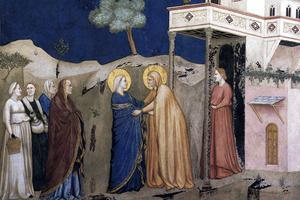The Visitation Is a Glorious Feast
Our Lady flew to the aid of St. Elizabeth as she shall do for us until the end of time.

“During those days Mary set out and traveled to the hill country in haste to the town of Judah, where she entered the house of Zechariah and greeted Elizabeth.” (Luke 1: 39-40)
Ostensibly, Mary picked up and hurried to the hill country to help her pregnant cousin. Luke even notes that she stayed for three months, presumably to assist at the birth of Elizabeth’s son, before returning to Nazareth.
On this side of heaven we cannot know what truly went on in Our Lady’s mind as she traveled along the dusty road, her mind no doubt still filled with the angel’s message to her and the burgeoning life within her. But I tend to think it was not merely a helpful whim that drove Mary with such haste to Zechariah’s door.
Upon being greeted by Elizabeth, whose unborn child leaps in joyful recognition of his unborn Lord, Mary proclaims her beautiful song of praise, the Magnificat. This canticle is not only the longest recorded speech we have by Our Lady, but it is nothing less than an effusion of joy and adoration. In its tone, we can get a glimpse of the sheer love Mary has for her Creator and the wonder she feels at the honor he has bestowed upon her in asking her to be his own mother.
When I read the Magnificat, I imagine the relief Mary must have felt to pour out this song. Here she was, with perhaps the only other woman on earth who could understand the magnitude of God’s blessings upon them. She did not have to hide her Son’s identity; Elizabeth had already proclaimed it, prompted by her own son. Mary can be unguarded. She knows that her fiat will bring suffering. She does not yet know the exact shape of her trials to come, but the many unknowns she faced as Christ’s mother would be enough to worry any heart.
But no trepidation colors the Magnificat. There is only deep joy and awe in God’s grace, and a certitude of her own place in salvation history. A place she treasures not out of pride, but out of the greatest humility, the lowliest maid exalted to be the mother of God, as proof of his greatness.
The joy of the Magnificat is, I posit, at the heart of why Mary made her journey to Judah. Her visit was not a command by God. Gabriel told her of the pregnancy, but he did not ask her to travel alone across the country to visit her cousin. She wanted to help her cousin, who no doubt was suffering a different kind of physical pain as an older woman experiencing pregnancy for the first time. Mary would doubtless feel duty-bound to stand at Elizabeth’s side at this time.
But even more than that, I imagine it was excitement, a wild joy that ached to be shared, that drove Mary over the dusty hills of Judah. This visit was not just that of a helpful relative; it was the first time Jesus was brought to be introduced and shared. Nestled beneath Mary’s heart, he traveled with her. This was his first journey as God made man. His mother’s body bore him under another’s roof so that the joy of the Incarnation could be shared. His cousin leapt at his coming, and Elizabeth named him aloud as her Lord.
The Visitation is a glorious feast. We see Our Lady flying to the aid of another as she does for us and shall do until the end of time. And we witness a woman burning with love for God, her footsteps foreshadowing the generations and millennia of missionaries who would come after, bringing her Son to every corner of the world.
Mary, mother of God, pray for us!
- Keywords:
- visitation

















